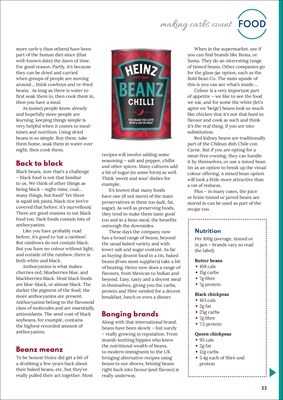
33
FOOD
making carbs count
Benefits of oats
Low fat: Oats are high in energy,
but low in fat - that's why
porridge is one of the best foods
for breakfast. An average bowl of
porridge made with water is only
171 calories.
Prolonged energy release: Oats
release their energy slowly, due to
having a high content of complex
carbohydrates and soluble fibre.
If you eat porridge for breakfast,
you'll stay fuller for longer,
avoiding the urge to snack before
lunch.
Wholegrain: Oatmeal and porridge
oats are two of the few wholegrain
foods that come out of the package
as 100% whole grain. Refined
grains are lower in fibre and other
nutrients because the bran and
germ are typically removed.
Nutrition: Oats are high in protein
and rich in vitamins and minerals
including calcium, zinc, iron,
manganese, thiamine and vitamins
B1 and E.
Low-GI: Oats are a low-GI food -
the lower the GI rating, the better
the food is for blood sugar levels.
Foods with a low GI index help the
body to keep energy levels steady,
and keep the hunger pangs at bay
for much longer (i.e they don't
'spike' your blood glucose).
Oats and cholesterol: As part
of a varied and balanced diet
and a healthy lifestyle, oat beta
glucans have been shown to help
lower blood cholesterol, which
may reduce the risk of coronary
heart disease. If the body has
more cholesterol than it needs,
cholesterol levels in the blood
can rise, and over time, may
damage or clog the arteries. Oats
act like tiny sponges, soaking up
cholesterol and carrying it out of
the bloodstream.
Soluble fibre: Oats contain more
soluble fibre, which is essential
for healthy digestion, than any
other grain. Scientists have shown
that soluble fibre can also help to
reduce cholesterol and maintain a
healthy heart when eaten as part
of a low-fat diet.
before they are rolled
Traditional Scottish porridge
oats and oatmeals are perfect for
making porridge and for using in a
wide variety of sweet and savoury
recipes. Hamlyns Scottish Oatmeal is
Scotland's leading brand of oatmeal.
We use only premium Scottish
oats, which are stoneground, using
traditional milling stones, milled to a
medium grade, which makes a superb
smooth porridge which can be made
in a pot or in the microwave.
Porridge Oats are te most popular
way to make porridge. Our porridge
oats are made with rolled Scottish
oatflakes, giving a delicious creamy,
filling porridge. They are great
if you're in a rush, as they cook
quickly, whether you choose to use
the microwave or the hob. Three to
four minutes should be all it takes
- just time to get the kettle boiled
and the toast made! Porridge oats
can also be used in a wide variety of
recipes, such as biscuits, crumbles
and breads.
Hamlyns Scottish Porridge Oats &
Bran have 10% added wheatbran
which gives the porridge a distinctive
taste. The addition of the wheatbran
helps to further aid digestion. These
oats can be used in any recipe
which includes porridge oats, but
is particularly good for biscuits,
flapjacks and fruit crumbles.
Pinhead Oatmeal is the most
traditional oatmeal. It's made from
the whole grain, with just the outer
husk removed, before the inner groat
is cut into three pieces. It makes
a substantial, nutty porridge. It's
best cooked in a saucepan but takes
longer to cook than porridge oats or
stoneground oatmeal (you can soak
it overnight first). It's also perfect for
adding texture and nutritional value
to soups and stews, for toppings
on pies, puddings and crumbles,
and even for coating fish and meat
before cooking.
*Pinhead oats will take longer to
cook as porridge, however if you
soak them overnight in water they
will take much less time to cook.
Two times World Porridge Making
Champion, Lisa Williams, uses a
mixture of pinhead oats and oatmeal
which she soaks the night before, but
you can just cook them for longer if
you haven't soaked them overnight.
RESOURCES
www.hamlynsoats.co.uk
www.heartuk.org.uk
Nutrition
Hamlyns Scottish Oatmeal,
Porridge oats and Pinhead
oats (in brackets is nutrition
for Hamlyns Scottish Porridge
Oats & Bran, which differs only
slightly in some cases). Per 40g
serving made with water:
Calories 150 (160);
Protein 4.5g (3.8g);
Carbohydrates 25g (29g);
Fat 3g (2g);
Fibre 3.5g (4g).
Trace of sodium